Environmental Management
Basic Approach
As part of its responsibilities as a corporate group involved in the supply of energy and materials, the ENEOS Group maintains a proper understanding of the impact of its business activities on climate change risks and natural capital. Environmental conservation has been included as a standard in the ENEOS Group Code of Conduct, and the Group has also established a Long-Term Vision and a Carbon Neutrality Plan, and is implementing initiatives for the development of a sustainable society.
In May 2019, ENEOS Holdings signed a statement of support for the recommendations of the Task Force on Climate-related Financial Disclosures (TCFD), and we are working to enhance and expand our disclosures concerning climate change. For details, see Our Response to Climate Change Risks and Opportunities (TCFD).
ENEOS Group Code of Conduct (excerpt)
- 3.Environmental conservation
- (1)We recognize that we are stewards of the environment and its limited resources. We strive to conserve biodiversity and natural capital, including, but not limited to, water, soil, and the atmosphere, and contribute to the development of a sustainable society.
- (2)We strive to promote renewable energy and energy conservation in order to contribute to the development of a decarbonized society.
- (3)We strive to contribute to the establishment of a circular economy by reducing, reusing and recycling, while using resources effectively and efficiently.
- (4)We strive to take actions to promote sustainable production and consumption for the benefit of society while taking the same actions throughout our value chain, including, but not limited to, resource development, procurement, production, distribution and sales.
Structure
In order to facilitate environmental management based on the Group Code of Conduct, the Group has established an environmental management system (EMS) headed by the CEO of ENEOS Holdings as Group chief executive. Under this system, we regularly confirm the status of achievement of environmental targets and compliance with environmental laws and regulations, and report the status to the ENEOS Holdings Executive Council and the Board of Directors, ensuring that environmental management performance is monitored and supervised by both organizations.
In addition, 89 of the 138 business sites that have adopted the EMS have obtained ISO 14001 certification, a set of international standards for environmental management, for a certification rate of 64%.
We have established the ENEOS Group Safety, Health & Environment Committee, chaired by the officer responsible for the Safety, Health & Environment Department at ENEOS Holdings. The committee meets, in principle, twice annually, where it deliberates on environmental targets, plans and performance of ENEOS Holdings and the Group’s principal operating companies and shares information on the status of activities in an effort to improve Group-wide environmental issues.
ENEOS Group Environmental Management System (EMS)
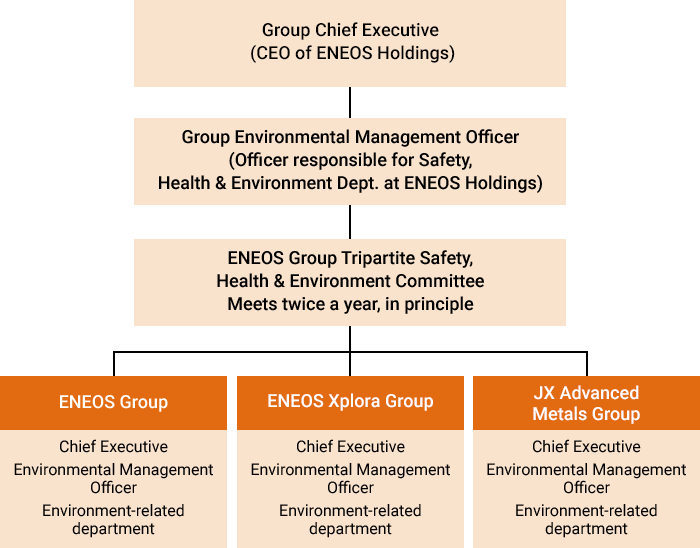
Plan and Targets
Carbon Neutrality Plan
In May 2020, the Group announced its intention to achieve carbon neutrality in its operational emissions by fiscal 2040. We subsequently released our Carbon Neutrality Plan in May 2022, taking into account domestic and international trends. In conjunction with the formulation of our third Medium-Term Management Plan (FY2023–FY2024), we formulated a new Carbon Neutrality Plan in May 2023. In May 2025, in light of changes in the business environment, we formulated the 2025 edition of the Carbon Neutrality Plan and announced it along with the fourth Medium-Term Management Plan.
The new Carbon Neutrality Plan was the subject of extensive discussions at meetings of the Carbon Neutrality Promotion Committee (chaired by the CTO), which was established in fiscal 2024. Amid growing uncertainty surrounding decarbonization, we presumed three societal scenarios and formulated the new Carbon Neutrality Plan. To reduce operational greenhouse gas emissions, we are carrying out initiatives based on reduction targets aligned with Japan’s Nationally Determined Contributions (NDCs), and to contribute to the reduction of downstream greenhouse gas emissions from sold products, we have created roadmaps for energy and materials transitions that meet societal demands. We will continue to lead the supply of energies and materials necessary for these transitions.
Policies on Initiatives for Realizing Carbon Neutrality
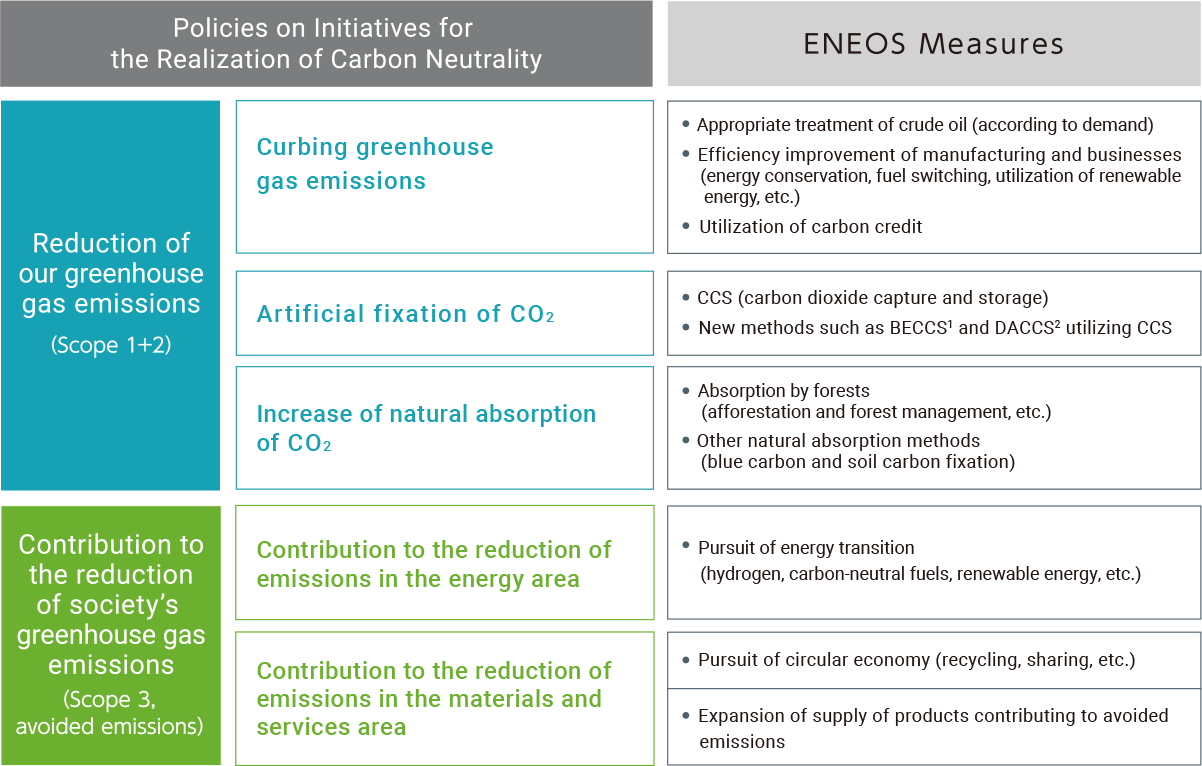
- 1This includes initiatives of both reduction and removal actions. Removal is conducted as a mitigation activity outside the value chain. These activities are also applied to offset the operational emissions through the generation of credits.
- 2This includes non-fossil certificates and other similar mechanisms.
- 3Bioenergy with carbon capture and storage. Capture and storage of CO2 emitted during biomass power generation.
- 4Direct air capture with carbon storage. Direct capture and storage of CO2 from the atmosphere.
- 5This includes biogenic CO2 removals and emission mitigation methods such as blue carbon and rice paddy methane suppression in addition to afforestation and forest management.
- 6Carbon dioxide removal
- 7This includes bio-derived fuels.
- Note:
- For details of the ENEOS Group Carbon Neutrality Plan, see our corporate website (Measures to Realize a Carbon-Neutral Society).
Reduction of Operational Greenhouse Gas Emissions1,2
The ENEOS Group, together with the government and society, will promote the reduction of its operational greenhouse gas emissions. We aim to achieve a 73% reduction in line with the government’s targets by fiscal 2040 and carbon neutrality for operational emissions by fiscal 2050.
- 1Greenhouse gas emissions and emission targets may be adjusted as necessary, taking into account the application of future Sustainability Standards Board of Japan (SSBJ) Climate Standard.
- 2Assumes that the external environment, including policies and regulations by the government and other parties, has been sufficiently developed to achieve Japan’s nationally determined contributions (NDCs) across the entire nation.
Greenhouse Gas Emissions Target (Scope 1+2)
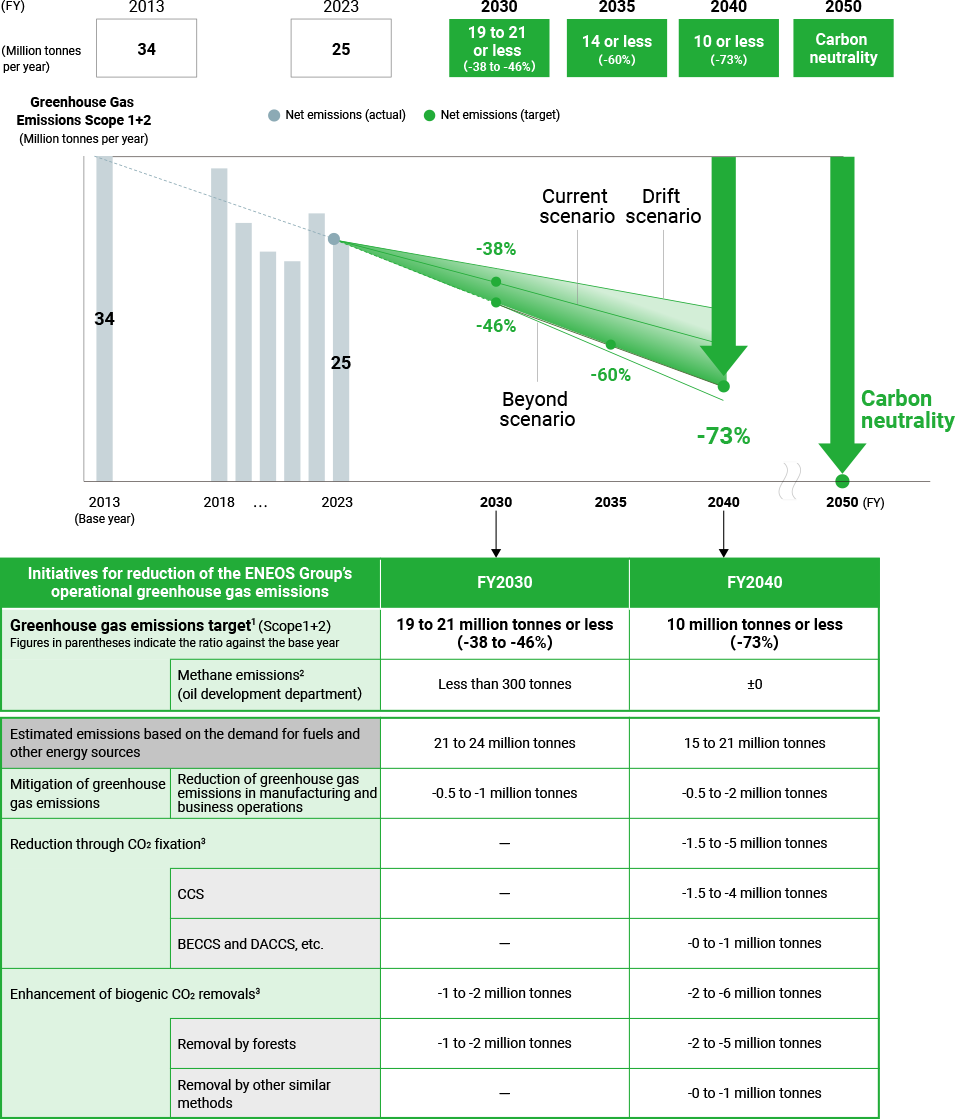
- 1Base year greenhouse gas emissions (fiscal 2013): 34 million tonnes
- 2Methane emissions (fiscal 2021): 1,600 tonnes
- 3Fiscal 2040 targets are based on the assumption that the external environment, including policies, laws, and technological progress, is sufficiently developed to enable large-scale commercialization.
Contribution to the Reduction of Downstream Greenhouse Gas Emissions from Sold Products
The ENEOS Group will lead the supply of energies and materials necessary for the transition to meet the societal demand for the reduction of greenhouse gas emissions, aiming to achieve carbon neutrality by fiscal 2050.
Roadmap for the Reduction of Downstream Greenhouse Gas Emissions from Sold Products
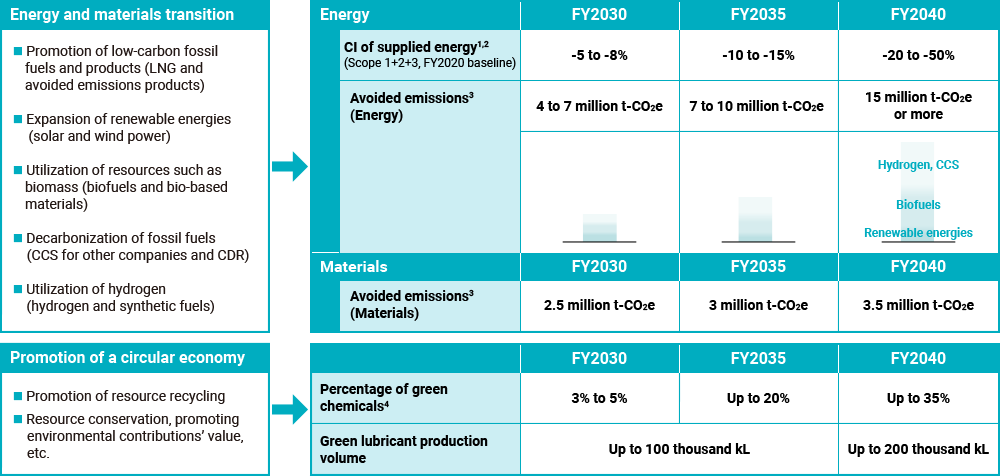
- 1The CI of supplied energy (an indicator of CO2 emissions [g] per unit of energy supply [MJ]) may be adjusted as necessary, taking into account the future application of climate change-related standards of the Sustainability Standards Board of Japan (SSBJ).
- 2The items included in CI are fuel oil, carbon-neutral fuels (biofuels and synthetic fuels), hydrogen, electricity (LNG-powered and renewable energies), CCS (implement into in-house manufacturing processes and sites to which energies are supplied), carbon offsets, and so on.
- 3Avoided emissions are estimated based on the GX League’s guidelines for emission reduction measures consistent with the Ministry of Economy, Trade and Industry’s technology roadmaps for each sector. Energy is based on stock; materials are based on flow.
- 4Ratio of products made from green chemicals to ones made from crude oil processed by a naphtha cracker
Overview of the ENEOS Group’s Environmental Impact
- For information about , see the Editorial Policy.
Input-Output of the ENEOS Group (Fiscal 2024 Results)
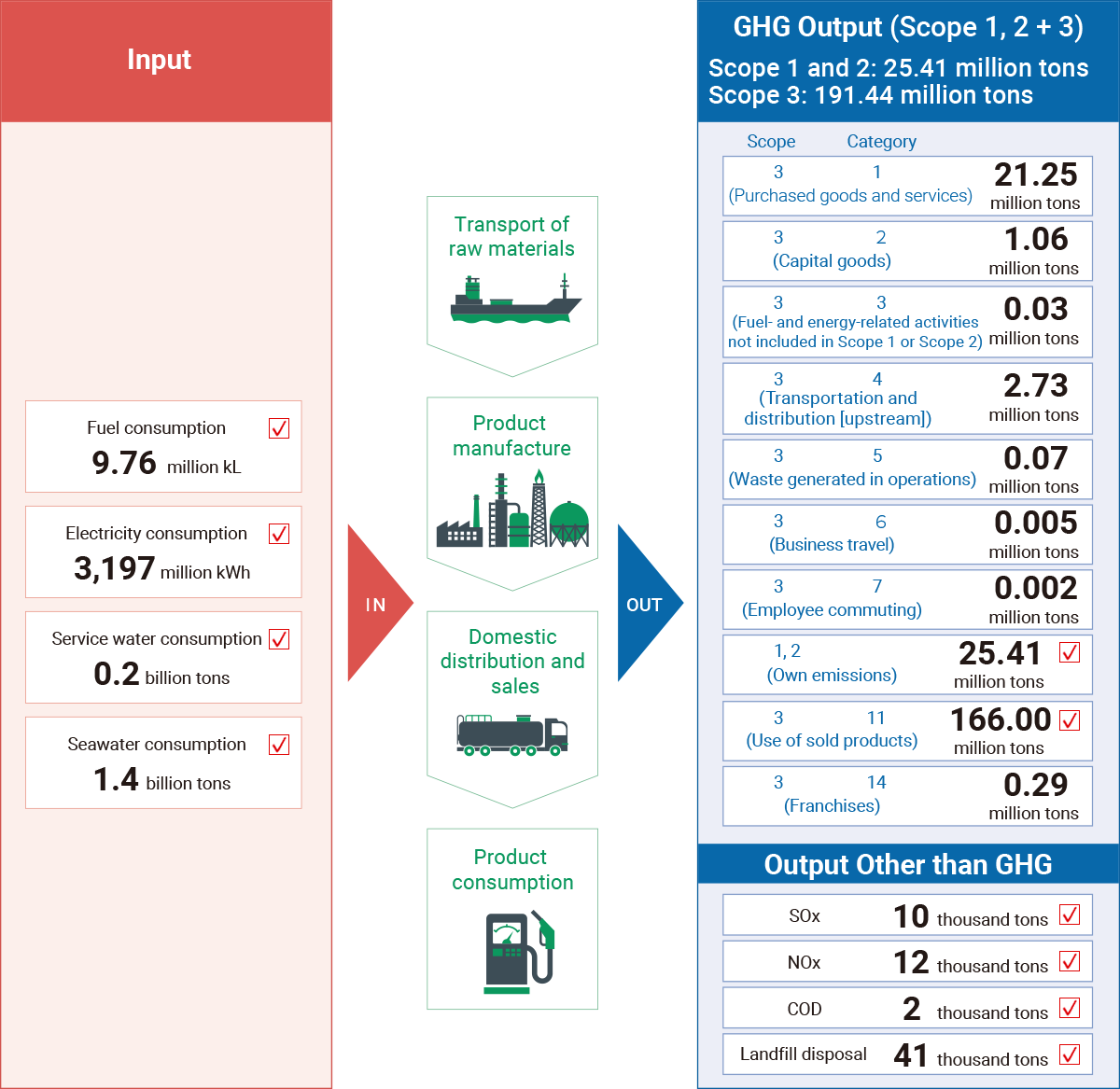
- Notes:
- Fuel consumption, electricity consumption, and GHG emissions are calculated based on the Act on Promotion of Global Warming Countermeasures. Fuel consumption and GHG emissions are calculated taking into account electricity sold and heat sold. GHG emissions from electricity use were calculated using the emissions factors by electricity supplier.
- Scope 3 emissions are calculated based on the Basic Guidelines on Accounting for Greenhouse Gas Emissions Throughout the Supply Chain ver. 2.7. Data covers ENEOS.
- GHG emissions associated with “Category 11: use of sold products” are calculated based on the latest petroleum product sales volumes.
- The Group’s GHG emissions (Scope 1 and 2) are calculated using the controlled approach in the GHG Protocol and cover main applicable organizations.
Major Initiatives
External Engagement Activities for a Decarbonized Society
The entire world must work together to achieve the Paris Agreement and the 1.5°C target, and government and policy will play an extremely large role in this. As such, the Company is involved with and contributes to the formulation of policy recommendations by actively participating in government initiatives, as well as economic organizations and trade associations and their activities.
Organizations with a particularly strong relationship with the Company and influence over climate change policy are government bodies the Ministry of Economy, Trade and Industry (METI) and Ministry of the Environment (MOE), and trade associations the Japan Business Federation (Keidanren) and the Petroleum Association of Japan (PAJ). Through collaboration and advocacy with these government bodies and trade associations, we are working to ensure that policy, technological innovation, the orientation of society and customer needs are aligned toward the achievement of carbon neutrality by 2050.
External Engagement Initiatives, Activities and Results
| Government | Stance | Achieve a decarbonized society and net-zero greenhouse gas emissions by 2050 | |
| Our initiatives |
|
||
| Our activities and results | METI |
|
|
| MOE |
|
||
| Keidanren | Stance | Utmost efforts to achieve carbon neutrality by 2050 | |
| Our initiatives |
|
||
| Our activities and results |
|
||
| PAJ | Stance | Contribute to the realization of carbon neutrality in society as a whole by aiming to achieve net-zero (carbon-neutral) CO2 emissions (Scope 1+2) associated with business activities and taking on the challenge of reducing CO2 emissions from our products (Scope 3) to net zero (carbon neutral) by 2050 | |
| Our initiatives |
|
||
| Our activities and results |
|
||
- *A framework based on the basic concept of the Ministry of Economy, Trade and Industry. With an eye toward achieving carbon neutrality and social transformation by 2050, the GX League is a venue where companies that are taking on the challenge of GX and aim to achieve sustainable growth in society both in the present and future collaborate with government and academia.
Environmental Education
With the aim of raising environmental awareness even further, the Group distributes environmental newsletters, holds e-learning sessions and provides regular classification-leveled education, training and drills for all employees to instill awareness of the Group’s basic environmental policies and various laws and regulations, and also to ensure basic knowledge of the environment.
Environmental Audits
All business sites that have obtained ISO 14001 certification are subject to regular internal audits based on the requirements of the standard in order to confirm and evaluate the effectiveness and conformance of their EMS activities. They also undergo an annual review by a third-party certification body to maintain their certification.
Preventing Environmental Accidents
As in fiscal 2023, there were no serious environmental accidents at our manufacturing sites in fiscal 2024.